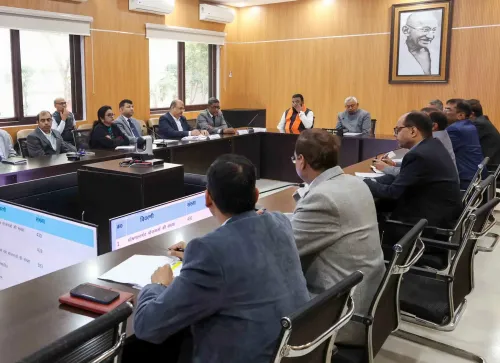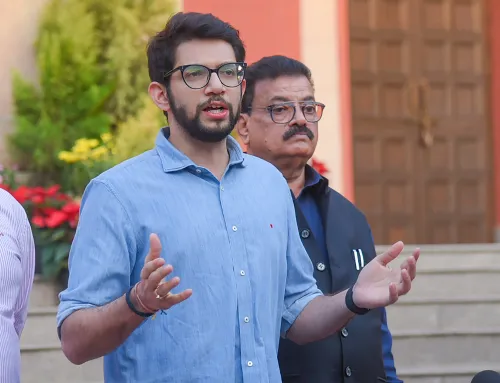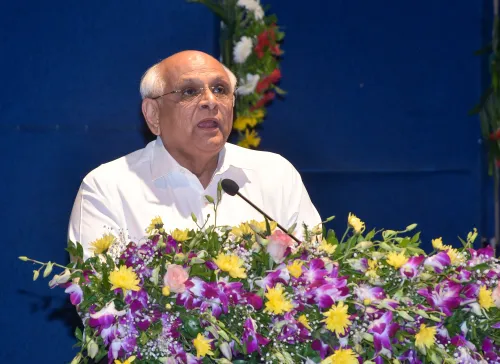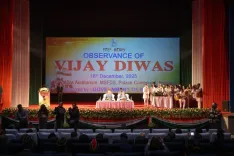How is Maha CM advancing carbon neutrality for Metro Lines 2A and 7?
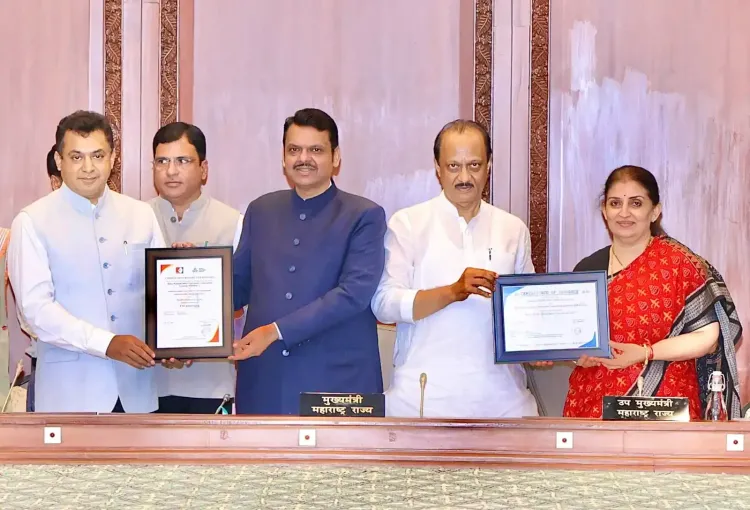
Synopsis
Key Takeaways
- Maharashtra CM Devendra Fadnavis presented Carbon Credit and Neutral Certificates for Metro Lines 2A and 7.
- Lines 2A and 7 are now recognized as carbon-neutral corridors, promoting eco-friendly commuting.
- MMRDA's commitment to sustainability aligns with India's climate goals.
- Carbon neutrality is achieved through verified carbon credits and emission reductions.
- Metro travel significantly reduces the carbon footprint compared to private transportation.
Mumbai, June 4 (NationPress) Maharashtra Chief Minister Devendra Fadnavis officially delivered the Carbon Credit Certificate and Carbon Neutral Certificate for Metro Lines 2A and 7. This initiative is a crucial advancement towards eco-friendly transportation and sustainable infrastructure in Maharashtra.
This accomplishment designates Lines 2A (from Dahisar East to DN Nagar) and Line 7 (from Dahisar East to Gundavali) as carbon-neutral corridors, which enhances Maharashtra’s objective for a more sustainable and environmentally friendly urban transport system, as highlighted in a statement from the Mumbai Metropolitan Region Development Authority (MMRDA).
CM Fadnavis remarked, “Achieving carbon neutrality is not just a global goal, but a local duty. Maharashtra takes pride in being at the forefront of the nation with certified solutions for climate-conscious mobility through MMRDA’s metro network.”
The Maha Mumbai Metro Operation Corporation Limited (MMMOCL) conducted a third-party evaluation to verify the carbon neutrality of these lines, which confirmed adherence to PAS 2060:2014, the global benchmark for carbon neutrality.
Moreover, the Universal Carbon Registry (UCR) has validated the issuance of 85,849 Carbon Offset Units (CoUs) to MMMOCL for the period from January 2023 to December 2024 under the initiative “Modal Shift for Lines 2A and 7.”
Looking into the future, MMRDA has commenced the registration of upcoming metro lines 2B, 4, 4A, 5, 6, 7A, and 9 under the VERRA Carbon Registry, recognized globally for greenhouse gas (GHG) emission reductions. This positions Mumbai as a national leader in climate-oriented urban transit.
“Carbon neutrality means balancing emitted carbon with an equivalent offset, achieving a net-zero carbon footprint. For metro operations, this entails calculating emissions mainly from electricity use and counterbalancing them through verified carbon credit projects. These credits arise from reducing emissions by encouraging a shift from personal vehicles to public metro transport,” stated the MMRDA in a release.
The significance of this initiative lies in the considerable environmental benefits of metro travel compared to private vehicles. By facilitating this modal transition, MMRDA has substantially diminished the carbon footprint of numerous daily commuters throughout the Mumbai Metropolitan Region.
An impressive reduction of 85,849 tonnes of CO₂ equivalent (TCO₂eq) has been accomplished when comparing greenhouse gas (GHG) emissions per passenger-kilometre between metro systems and road vehicles, as per the release.
For a densely populated and rapidly evolving city like Mumbai, achieving carbon neutrality has extensive implications including a decrease in urban air pollution, enhanced public health, lower greenhouse gas emissions aligning with India’s Nationally Determined Contributions (NDCs), boosted climate resilience by reducing reliance on fossil fuels, and attracting international climate finance and green investments due to certified infrastructure.
Deputy Chief Minister & MMRDA Chairman Eknath Shinde stated, “The future of Mumbai is green, modern, and inclusive. The recognition of Metro Lines 2A and 7 as carbon-neutral demonstrates that our infrastructure is not only of world-class quality but also deeply committed to environmental sustainability.”
Metropolitan Commissioner Sanjay Mukherjee remarked, “At MMRDA, sustainability is integral to our planning and execution. From carbon-neutral metro operations to multimodal integration and green mobility initiatives, every project aligns with our vision of creating a climate-resilient and environmentally responsible Mumbai. This recognition reaffirms that infrastructure can be progressive and eco-friendly.”
MMMOCL Managing Director Rubal Agarwal added, “We take pride in operationalizing carbon-neutral metro corridors. With verified carbon credits and upcoming VERRA projects, MMMOCL is actively spearheading the transition towards net-zero public transportation.”


